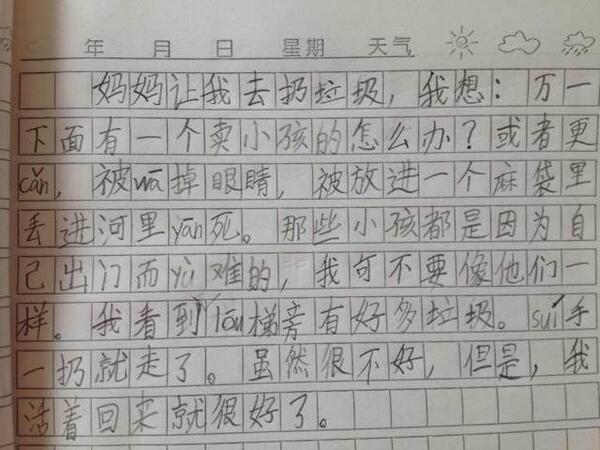Archive for Writing systems
December 3, 2013 @ 2:28 am· Filed by Victor Mair under Alphabets, Diglossia and digraphia, Language and computers, Language and the movies, Writing systems
On September 25, I posted on "Character amnesia and the emergence of digraphia", which occasioned a vigorous debate. A few of the commenters thought the essay in question wasn't actually written by a student. Be that as it may, this habit of replacing characters by Pinyin is becoming more and more common, especially among young students. Let us look at this scene from the Chinese documentary "Qǐng tóu wǒ yī piào" 请投我一票 (Please vote for me) at (34:29).
Read the rest of this entry »
Permalink
November 30, 2013 @ 9:30 pm· Filed by Victor Mair under Alphabets, Language and sports, Writing systems
Below is a photo that Bryan Van Norden took of a baseball cap a guy was wearing at a casino in Atlantic City. Someone else at the table asked him what it meant, and he said he thought it was Chinese for "good luck." Bryan explained that he was wrong.

Read the rest of this entry »
Permalink
November 29, 2013 @ 8:05 pm· Filed by Victor Mair under Forgeries, Manuscripts, Writing systems
A Chinese book purportedly publishing a Gelao 仡佬 manuscript fell into my hands a few weeks ago (I think that it may have been sent to me by a friend in Hong Kong). I took one look at the manuscript and felt that it was phony. Not wanting to deal with it, and yet not wanting to throw it away, since it was a specimen of something, I promptly put the book in the mailbox of my colleague, Adam D. Smith, who is a specialist on writing systems in China.
Read the rest of this entry »
Permalink
November 19, 2013 @ 6:10 pm· Filed by Victor Mair under Diglossia and digraphia, Transcription, Writing systems
From Jason Cox (with additions and modifications by VHM):
In Taiwan, one often comes across efforts at using zhùyīn 注音 ("phonetic annotation") to hint to readers that a Hoklo Taiwanese reading of the sentence is preferred, rather than a Mandarin reading. Sometimes the characters are "correct" Hoklo Taiwanese (they convey the meaning of the characters directly); sometimes they will simply sound like Hoklo Taiwanese when read in Mandarin. Two examples that come to mind:
Read the rest of this entry »
Permalink
November 10, 2013 @ 11:11 am· Filed by Victor Mair under Dialects, Dictionaries, Language and culture, Language and the media, Pronunciation, Writing systems
At the expense of English and of other Chinese topolects and languages?
We have seen that, in recent weeks and months, there has been considerable agitation against the increasing role of English in Chinese education and life in general. Supposedly, overemphasis on English is leading to the deterioration of Chinese language skills. Consequently, the amount of time devoted to English in schools is to be reduced, the weight placed upon English in college entrance examinations is to be decreased, and there are calls for children to begin to study English later than first grade of elementary school, which is the case now.
Read the rest of this entry »
Permalink
November 6, 2013 @ 1:09 am· Filed by Victor Mair under Orthography, Writing systems
As birth rates decline in many modernized countries around the world, it's interesting to think about what's driving that in each place, since the factors are never exactly the same.
In Japan, which is famous for having one of the lowest birthrates in the world (Germany has the lowest rate), a large part of it may be attributed to what is known as the "celibacy syndrome":
sekkusu shinai shōkōgun セックスしない症候群 (literally, "syndrome of not doing sex"; 39,100 ghits)
Read the rest of this entry »
Permalink
October 30, 2013 @ 11:06 am· Filed by Victor Mair under Alphabets, Borrowing, Diglossia and digraphia, Found in translation, Language and advertising, Language and culture, Language and food, Multilingualism, Orthography, Pronunciation, Psychology of language, Slogans, Spelling, Transcription, Translation, Writing systems
Together with his "greetings from small-town Japan", Chris Pickel sent in this photograph of a sign, which was put up in his neighborhood for the aki-matsuri 秋祭り ("autumn festival").

Read the rest of this entry »
Permalink
September 27, 2013 @ 4:26 am· Filed by Geoffrey K. Pullum under Errors, Esthetics, Humor, Ideography, Language and art, Language exotification, Language play, Languages, Lost in translation, Names, Pragmatics, Psychology of language, Punctuation, Reading, Silliness, Slogans, Typography, Writing systems, WTF
I've been reading way too much Victor Mair. In the restaurant of my hotel in London I just saw an English girl wearing a T-shirt on which it said this:
And I immediately thought, who is Ho Pe?
Read the rest of this entry »
Permalink
September 25, 2013 @ 12:52 pm· Filed by Victor Mair under Diglossia and digraphia, Language and education, Pedagogy, Writing, Writing systems
David Moser saw this photograph of a child's essay via Twitter:

Read the rest of this entry »
Permalink
September 20, 2013 @ 2:34 pm· Filed by Victor Mair under Found in translation, Language and art, Lost in translation, Multilingualism, Writing systems
Here is a closeup of a remarkable work of installation art that is being shown at this year's Venice Biennale:

Read the rest of this entry »
Permalink
August 28, 2013 @ 11:42 pm· Filed by Victor Mair under Writing systems
Andy Averill sent in the following picture of a Chinese person with the English word "value" tattooed on her right shoulder:

Read the rest of this entry »
Permalink
August 16, 2013 @ 8:12 am· Filed by Victor Mair under Language and computers, Spelling, Writing, Writing systems
Considering the fact that we've had a lot of traffic on spelling bees, character amnesia, simplified characters, and whatnot on Language Log recently, it's not surprising that the following article by Dan Kedmey would appear in Time yesterday (Aug. 15, 2013), though without any mention of Language Log: "What the Word 'Toad' Can Tell You About China’s Modernization".
At first I was going to just write a short note about this article and add it as a comment to this post from a week ago. But the more I read through the article, the more annoyed I became by how riddled with errors it is. So I've decided to write this post listing some of the more egregious mistakes, lest innocent readers be led astray. After all, Time still commands a substantial readership, so the magazine needs to be held accountable for the accuracy of its statements, even when writing about something so supposedly quaint as Chinese — which, by now, certainly should no longer be viewed as exotic at all, since China has become very much a part of the global economy.
Read the rest of this entry »
Permalink
August 7, 2013 @ 7:38 pm· Filed by Victor Mair under Alphabets, Spelling, Writing systems
An article in today's Want China Times entitled "Audience of Chinese 'spelling bee' forget how to write" begins thus:
Chinese characters are difficult to learn not only for non-native speakers but also for natives as well. This was made evident in a contest held by China's state broadcaster CCTV to test teenagers on their ability to write Chinese characters, reports the internet portal Tencent.
Read the rest of this entry »
Permalink




